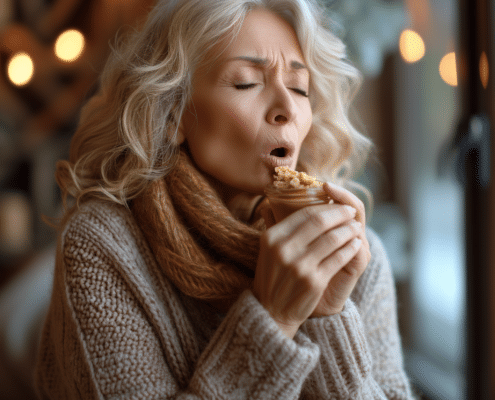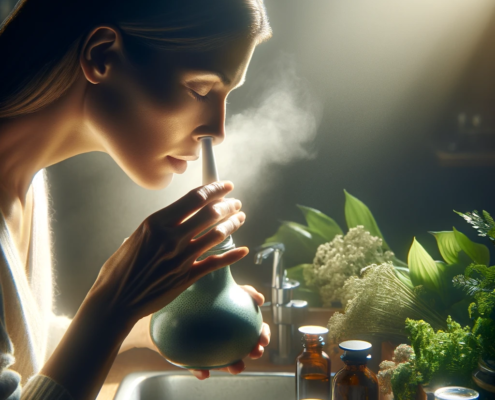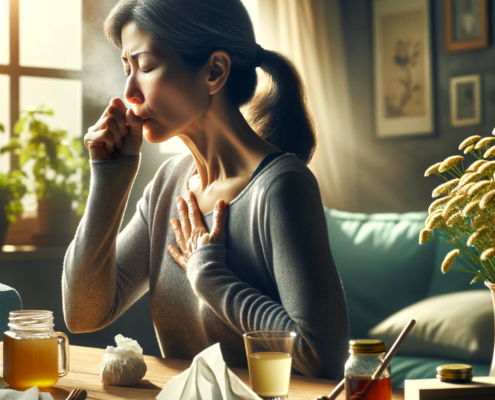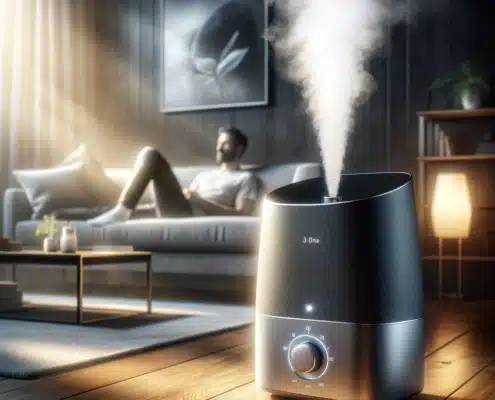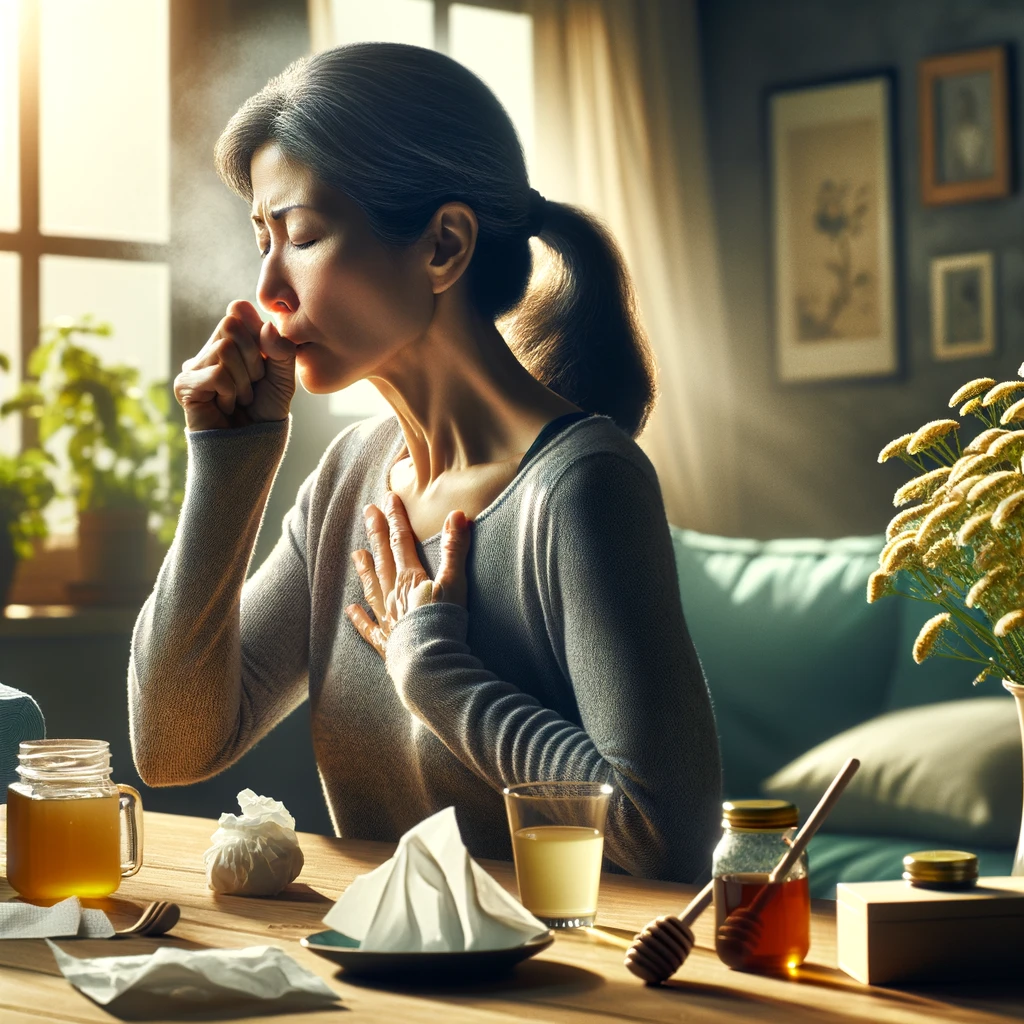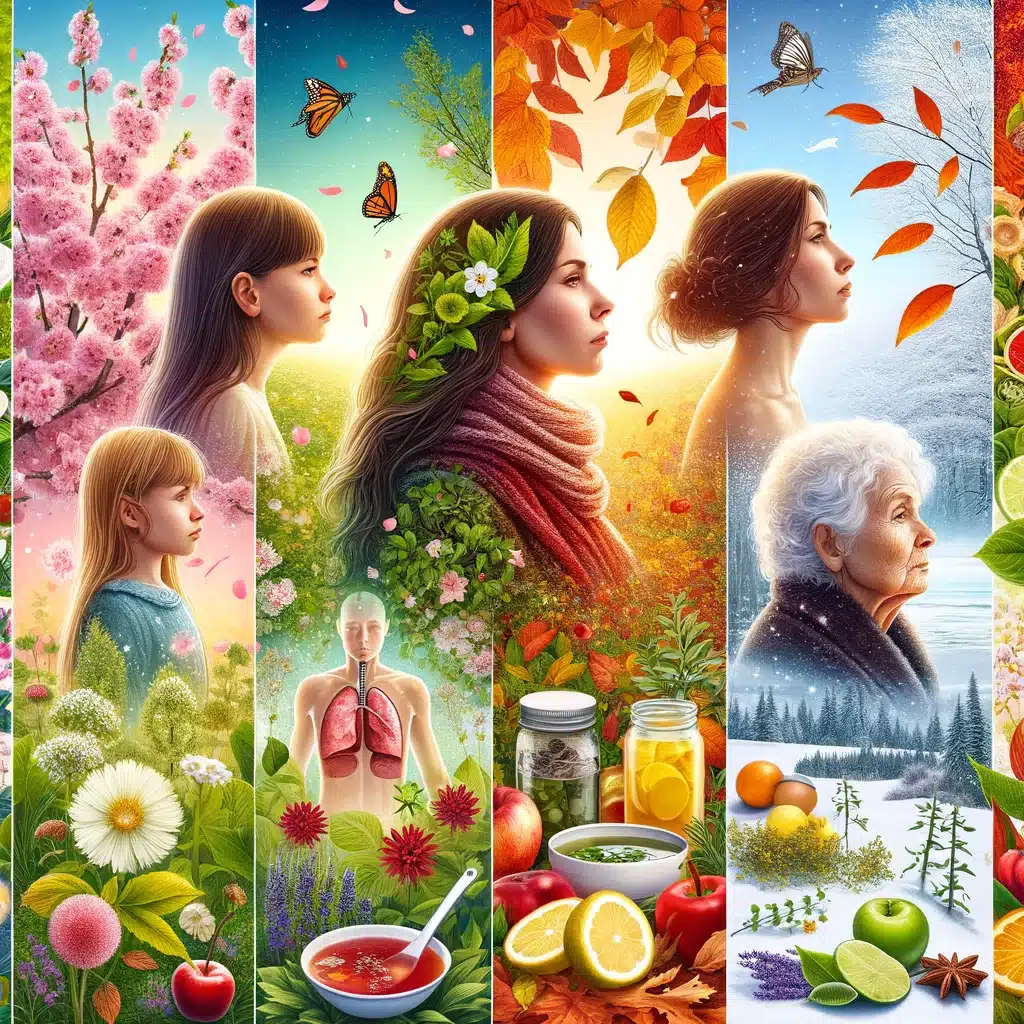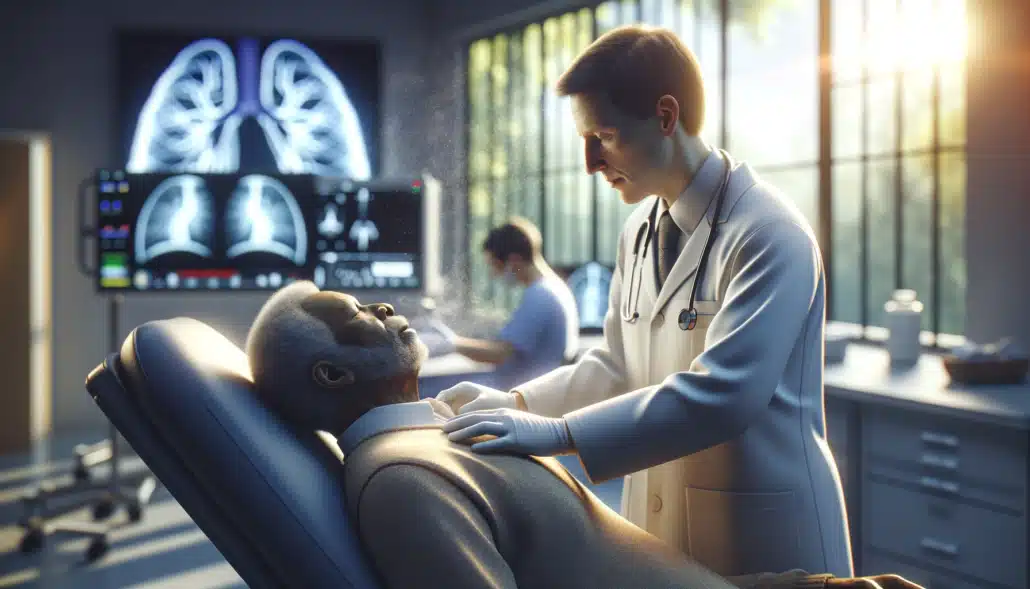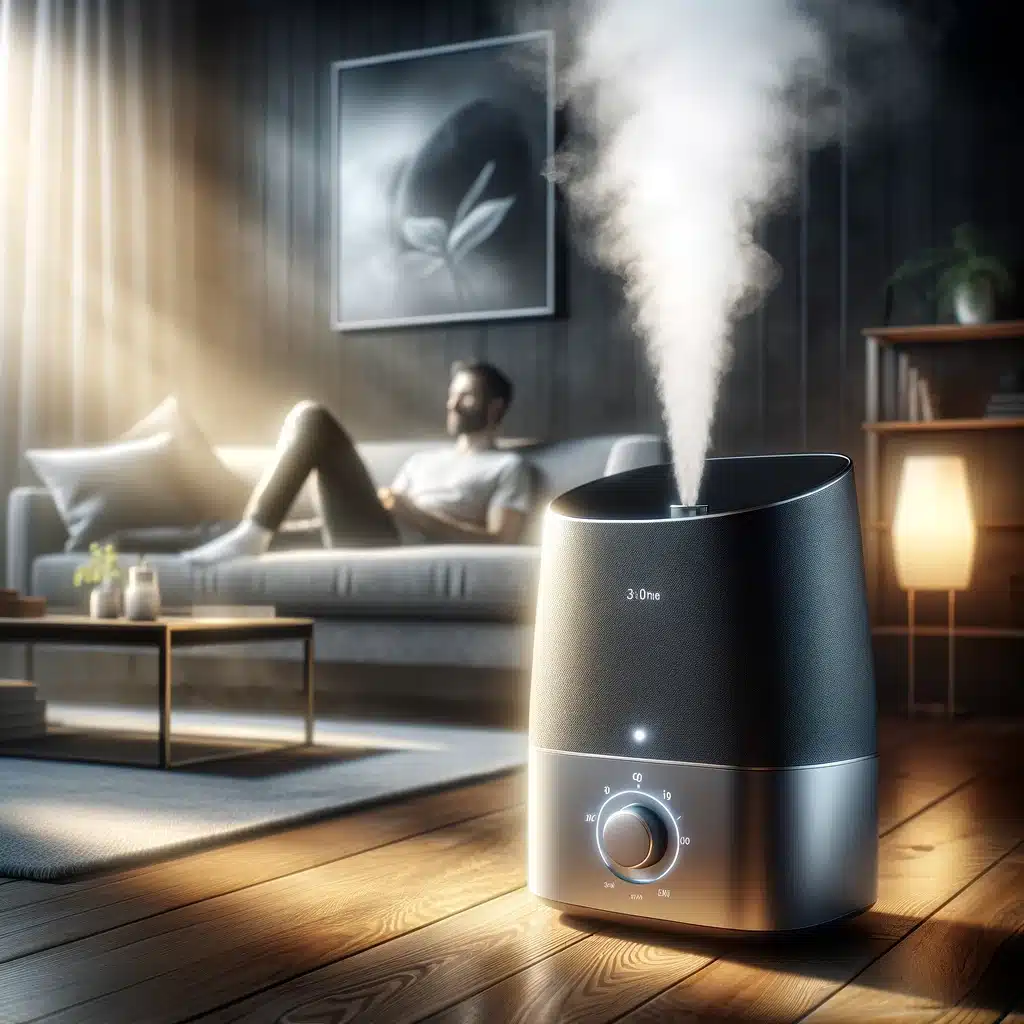Unveiling the Secrets of Cough and Phlegm: Causes, Treatment, and Relief
Welcome to the official Cough and Phlegm section of Jonathan Bailor! If you’re interested in more of our health guides and topics, make sure to check out our Brain Health, Colon Health, Thyroid Health, Gut Health, or Hormone Health sections! Let’s dive in.
Coughing and phlegm production are natural bodily responses that we all experience from time to time, but do we truly understand their secrets and implications? In this comprehensive blog post, we will unveil the mysteries behind cough and phlegm, exploring their causes, the different types of coughs, and the significance of phlegm colors. Furthermore, we will delve into various treatment options and prevention strategies, ensuring you are well-equipped to manage and understand these common yet often misunderstood symptoms.
Key Takeaways
- Understanding the differences between productive and nonproductive coughs, as well as their causes, is essential for determining an appropriate treatment.
- Common causes of cough and phlegm include viral/bacterial infections, allergies, environmental irritants & lung diseases. Recognizing phlegm colors can help guide diagnosis.
- Treatment options may include over-the-counter medications or prescription drugs. Lifestyle changes & home remedies are also effective in managing symptoms but medical attention should be sought if they persist or worsen.
Understanding Cough and Phlegm
A cough is a reflex that occurs spontaneously, often as a symptom of a lung infection. It can be classified into two main categories: productive and nonproductive coughs. Determining the underlying cause and appropriate course of treatment requires an understanding of the differences between these types of coughs.
Phlegm, on the other hand, is a viscous substance produced in the lungs and throat. The color and consistency of phlegm can provide valuable clues about the underlying condition causing the cough.
The specifics of productive and nonproductive coughs, along with the various causes of cough and phlegm, will be discussed in detail in the subsequent sections.
Productive Cough
A productive cough is characterized by the expulsion of phlegm when coughing, which can be a sign of a chronic cough. It serves to expel mucus and foreign particles from the airways, aiding in the clearance of irritants from the respiratory system, including bloody phlegm. This type of cough is often associated with health conditions such as:
- Asthma
- Chronic obstructive pulmonary disease (COPD)
- Pneumonia
- Bronchitis
- Viral or bacterial infections
Despite the discomfort they can cause, productive coughs play a crucial role in our body’s defense mechanism. They help maintain lung health and prevent complications from mucus and foreign particle accumulation by effectively clearing irritants from our respiratory system.
Nonproductive Cough
In contrast, a nonproductive cough, also known as a dry cough, is a type of cough that does not produce phlegm or mucus. It may be caused by irritation or inflammation in the throat, often resulting from viral infections, allergies, or exposure to environmental irritants. Indications of a nonproductive cough may include a dry, tickly, and irritating sensation, as well as a sensation of a lump in the back of the throat, difficulty swallowing, and coughing at night.
Although nonproductive coughs do not expel mucus, they still serve as a reflex response to clear the airways of irritants or foreign bodies caused by the irritation of cough receptors in the airways. Treatment options for a nonproductive cough may include:
- Over-the-counter medications
- Prescription medications
- Lifestyle modifications
- Home remedies
Common Causes of Cough and Phlegm
Various factors, including:
- Viral and bacterial infections
- Allergies
- Environmental irritants
- Lung diseases
are commonly associated with coughs and phlegm. Identifying the root cause is vital for ensuring appropriate treatment and symptom relief.
Each of these common causes will be explored in the subsequent subsections, providing a detailed insight into the factors contributing to cough and phlegm production and enhancing understanding of these symptoms that appear simple yet are complex.
Viral Infections
Viral infections, such as the common cold, influenza (flu), pneumonia, and bronchitis, are among the most frequent causes of cough and phlegm. These infections can cause inflammation and irritation in the respiratory tract, leading to an increase in mucus production as a protective response by the body. The excess mucus helps trap and remove the virus and other irritants from the airways, resulting in coughing and the production of phlegm.
Phlegm produced by viral infections is generally yellow or green in color. These infections are often accompanied by other symptoms, such as a sore throat, headache, and runny nose, and may produce little to no mucus. Differentiating between viral and bacterial infections is key, as bacterial infections may require antibiotic treatment, unlike viral ones.
Bacterial Infections
Bacterial infections, such as respiratory tract infections, include lower respiratory tract infections like:
- Streptococcus pneumoniae
- Bacterial bronchitis
- Laryngotracheitis
- Bacterial pneumonia
can also cause coughs and phlegm. Infections like bronchitis and pneumonia lead to inflammation in the airways, increasing mucus production. This excess mucus narrows the airway and activates the cough reflex, resulting in coughing and the expulsion of phlegm.
The primary distinction between viral and bacterial infections in terms of phlegm production lies in the color of the mucus. Generally, clear or white mucus suggests a viral infection, while yellow or green mucus may indicate a bacterial infection. Consultation with a healthcare professional for a proper diagnosis and treatment plan is necessary, especially as bacterial infections may require antibiotics.
Allergies
Allergies, such as allergic rhinitis (hay fever) and seasonal allergies, can contribute to coughing and phlegm production by causing postnasal drip. Postnasal drip occurs when an excess of mucus drains down the throat, resulting in coughing up phlegm. Common allergens that can trigger coughing and phlegm production include:
- Pollen
- Dust
- Mold spores
- Animal dander
Seasonal allergies, like hay fever, can also cause coughing and mucus production due to irritation and inflammation in the throat and airways. Identifying and avoiding allergens, along with maintaining a clean, allergen-free environment, is necessary to lessen the impact of allergies on cough and phlegm.
Environmental Irritants
Environmental irritants that can provoke coughing and phlegm production include:
- Ambient particulate matter
- Cigarette smoke
- Biomass fuel
- Occupational dust and gas
- Respiratory infections
- Allergens like pollen and dust mites
- Air pollutants
These irritants cause irritation and inflammation in the airways, leading to increased mucus production and the activation of the cough reflex.
Exposure to secondhand smoke can also result in an excess of phlegm. Maintaining a clean, irritant-free environment, avoiding smoking or exposure to secondhand smoke, and practicing proper respiratory hygiene are crucial to lessen the impact of environmental irritants on cough and phlegm.
Lung Diseases
Lung diseases, such as asthma, chronic obstructive pulmonary disease (COPD), and chronic bronchitis, are examples of lung diseases that can lead to persistent coughing and excessive production of phlegm. In asthma, mucus hypersecretion leads to increased production and secretion of airway mucins, causing mucus hypersecretion and obstruction of the airways. In COPD, inflammation and narrowing of the airways lead to overproduction of mucus, resulting in coughing and the accumulation of excess phlegm.
Recognizing the signs of an asthma-related cough and phlegm, such as:
- a persistent dry cough
- wheezing
- chest tightness
- shortness of breath
can help ensure early diagnosis and treatment. Early detection and management of COPD, asthma, lung cancer, and other lung diseases can help in getting timely medical intervention and treatment, preventing the worsening of symptoms. Therefore, it is important to be aware of the symptoms of these diseases so that you can seek timely diagnosis and treatment.
Identifying Phlegm Colors and Their Meanings
Phlegm color can offer valuable insights into the underlying cause of a cough and guide appropriate treatment and symptom relief. Grasping the implication of various phlegm colors can enhance your health assessment and guide necessary actions.
Clear or white mucus generally indicates a viral infection, while yellow or green mucus may suggest a bacterial infection. Other colors, such as brown or black, may indicate exposure to environmental irritants or specific lung conditions like pneumoconiosis, also known as “coal workers’ lung”. Recognizing these different colors and their associated causes can empower you to make informed decisions about your health and seek appropriate medical help when needed.
Treatment Options for Cough and Phlegm
Treatment options for cough and phlegm vary depending on the underlying cause and may include supportive care and medications. Over-the-counter medications like cough suppressants and expectorants may sometimes be sufficient to alleviate symptoms. Prescription medications may be necessary in more severe cases or when an underlying condition is present.
Various treatment options for managing and treating cough and phlegm symptoms include:
- Over-the-counter medications
- Prescription medications
- Lifestyle changes
- Home remedies
This comprehensive overview is aimed at aiding in making informed decisions about managing and treating cough and phlegm symptoms.
Over-the-Counter Medications
Over-the-counter medications, like cough suppressants and expectorants, can help alleviate cough and phlegm symptoms. Cough suppressants, such as Delsym, Buckley’s Mixture Cough Suppressant, and Vicks 44 Custom Care Dry Cough, work by inhibiting the cough reflex in the brain. Expectorants like guaifenesin effectively thin mucus, making it easier to expel. Consulting with a healthcare professional before taking any medication is crucial, especially in the case of children under 6 years old.
Although over-the-counter medications can provide relief in many cases of cough and phlegm, it’s important to remember that their applicability may not extend to all situations. In cases of bacterial infections, underlying conditions, or more severe symptoms, a visit to a healthcare professional may be necessary to determine the appropriate course of treatment.
Prescription Medications
Prescription medications may be required for more severe cases of cough and phlegm or to treat underlying conditions causing the cough. These medications are typically stronger than their over-the-counter counterparts and may contain ingredients such as codeine or benzonatate, which are not present in over-the-counter options.
Common prescription medications for cough and phlegm include guaifenesin, benzonatate, and guaifenesin and hydrocodone combination medications. A consultation with a healthcare professional is crucial to determining the most suitable prescription medication for your specific situation and ensuring proper dosage and usage.
Lifestyle Changes and Home Remedies
Lifestyle changes and home remedies that can help alleviate cough and phlegm symptoms include:
- Staying hydrated
- Using a humidifier
- Keeping the air humid
- Consuming adequate amounts of fluids
- Applying a warm, moist washcloth to the face
- Maintaining an elevated head position
- Refraining from suppressing a cough
These lifestyle modifications can be beneficial for managing and alleviating cough and phlegm symptoms.
Effective home remedies for cough and phlegm may include:
- Saltwater gargle
- Herbal tea or clear broth
- Honey and ginger
- Steam inhalation
These remedies can help thin mucus and relieve cough and phlegm symptoms. While home remedies can offer relief, it’s important to remember that they may not be suitable for all situations. If symptoms persist or worsen, consult a healthcare professional for guidance.
When to Seek Medical Attention
Knowing when to seek medical attention for coughs and phlegm is essential. If the cough persists for more than 10 days or if there are other concerning symptoms, it’s advisable to consult a healthcare professional. Additionally, if you experience a persistent cough or any concerning symptoms, seeking medical attention is recommended.
Concerning symptoms that should prompt medical attention include:
- High fever
- Difficulty breathing
- Chest pain
- Coughing up blood
- Sudden worsening of symptoms
Timely medical intervention in such cases is crucial for appropriate diagnosis and treatment, preventing potential complications, and promoting a swift recovery.
Preventing Cough and Phlegm
Prevention of cough and phlegm begins with recognizing and addressing potential causes. Here are some preventative measures that can be taken to reduce the risk of coughing caused by viral infections:
- Practice good hand hygiene
- Avoid allergens
- Maintain a healthy lifestyle
- Implement proper hand hygiene
- Maintain physical distancing
- Receive vaccinations against COVID-19 and influenza
- Adhere to cough etiquette
- Remain at home when ill
By following these measures, you can reduce the risk of cough and phlegm.
In addition to these measures, maintaining a clean and allergen-free environment, staying hydrated, and engaging in regular exercise can help strengthen the immune system and reduce the risk of developing cough and phlegm. By taking a proactive approach to prevention, you can minimize the impact of these symptoms on your life and enjoy better respiratory health.
Summary
In conclusion, understanding the secrets of cough and phlegm can empower you to take control of your respiratory health and make informed decisions about treatment and prevention. By recognizing the differences between productive and nonproductive coughs, identifying the various causes and colors of phlegm, and exploring a range of treatment options, you can effectively manage these common yet often misunderstood symptoms. Remember, if you experience persistent or concerning symptoms, seeking medical attention is crucial to ensure a proper diagnosis and appropriate treatment. Stay informed, stay healthy, and breathe easy.
Frequently Asked Questions
What does a cough with phlegm indicate?
A productive cough that brings up phlegm indicates a possible infection, such as pneumonia, bronchitis, or the flu. The color of the mucus may signal a more serious underlying condition. It is crucial to speak with a doctor if your cough produces yellowish-green phlegm or contains blood.
How do you get rid of phlegm cough?
Stay hydrated, use a humidifier, gargle with salt water, take OTC expectorants, use eucalyptus oil, and keep the air moist to help clear phlegm and get rid of a phlegm cough.
Is a phlegmy cough a symptom of COVID?
Yes, a phlegmy cough can be one of the symptoms of COVID-19, along with chest congestion. These wet and productive coughs can last even after the coronavirus is resolved.
When should I be worried about coughing up phlegm?
If you have been coughing up phlegm for more than two weeks or if the phlegm is of a particular color accompanied by wheezing, fever, or other symptoms, seek medical advice immediately.
What is the difference between a productive and nonproductive cough?
A productive cough involves the expulsion of phlegm, whereas a nonproductive cough, also known as a dry cough, does not produce mucus.


